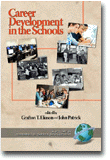
Career Development in the Schools
Edited by:
Grafton T. Eliason, California University of Pennsylvania
John Patrick, California University of Pennsylvania
A volume in the series: Issues in Career Development. Editor(s): Grafton T. Eliason, California University of Pennsylvania. John Patrick, California University of Pennsylvania.
Published 2008
Career Development in the Schools describes a dynamic process that continues to evolve in its rationale and practice. In many schools and in a variety of scholarly writings, the status of career development is controversial. Some observers assert that career development should be seen as a by-product of all of the knowledge and activities that are incorporated in the educational experience. In this view, career development tends to be seen as a random process that happens in a natural, almost magical way, without specific direction or structured form. However, most career theorists would argue that the career development of students should be a major mission of the school—a process too important to be only a by-product of scattered learning and activities that are inherently uneven from student to student. The prevailing contemporary perspective contends that career development in the schools should be planned, have its own content derived from research and theory, be systematically executed, and use methods that are relevant to the developmental levels of students throughout elementary, middle, and senior high schools. To further such ends, several national models of content and practice have been formulated by the American School Counselor Association, the National Career Development Revised Guidance Project, and by other organizations to identify the components, competencies, and outcomes that students of different ages and aspirations need to acquire as they grow in maturity. Several of these models are discussed at length in the various chapters of this book.
CONTENTS
Foreword, Edwin L. Herr. Introduction. The ASCA Model and the Educational Trust: The Changing Role of Career Counselors in the Schools, William Rullo, Grafton T. Eliason, and John Patrick. The Evolution of Career Counseling in the Schools, Brian Hutchison, Spencer G. Niles, and Jerry Trusty. Outcome-Based Assessment for Career Development in the Schools, Chris Wood. Legislative Impact: A Holistic Paradigm for Professional School Counselors and Teachers in K–12 Career Development, David L. Olguin and Connie Maple. Career Assessment Portfolios: Documentation and Accountability Empowering Transformed Professional School Counselors, George T. Williams and Joseph D. Wehrman. Service Learn SCE DI: Developing Service Learning Projects Using Self-Concept Enhancement Through Differentiated Instruction, Mark Lepore and Joseph Petrella. New Technology and Career Development in the Schools, Jeff L. Samide and Jake McElligott. Solution-Focused Theory Applied to Career Counseling, Nadine E. Garner and James P. Valle. Adolescent Vocational Choice: An Adlerian Perspective, Emily M. Sweitzer. Career Family Trees: The Use of Genograms in Career Counseling of Students in K–12 Settings, Donna M. Gibson.
-
Paperback978-1-59311-533-3
Web price: $45.04 (Reg. 52.99)
-
Hardcover978-1-59311-534-0
Web price: $80.74 (Reg. 94.99)
- eBook9781607528302

- EDU003000 - EDUCATION: Aims & Objectives
- EDU015000 - EDUCATION: Higher
- EDU037000 - EDUCATION: Research
-
 Career Counseling Across the Lifespan
Community, School, and Higher Education
Career Counseling Across the Lifespan
Community, School, and Higher Education
-
 Career Development Across the Lifespan
Counseling for Community, Schools, Higher Education, and Beyond (2nd Edition)
Career Development Across the Lifespan
Counseling for Community, Schools, Higher Education, and Beyond (2nd Edition)
-
 Career Development in Higher Education
Career Development in Higher Education
-
 Institutional Diversity in American Postsecondary Education
Institutional Diversity in American Postsecondary Education
-
 Issues in Career Development
Issues in Career Development
-
 Promoting Equitable Classroom Practices in Higher Education
Approaches Beyond Curriculum
Promoting Equitable Classroom Practices in Higher Education
Approaches Beyond Curriculum
-
 The Handbook for Aspiring Higher Education Leaders
The Handbook for Aspiring Higher Education Leaders

